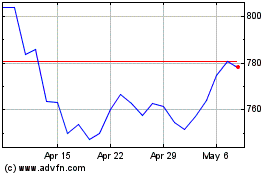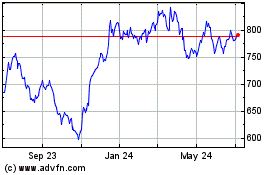By William Louch
Business development companies, which raise money from investors
and loan it to small, private businesses that need capital, have
been among the hardest hit in this month's stock market rout.
The market losses seen by these lenders, many of which are
managed by well-known private-equity firms or asset managers,
reflect broader concerns about whether the highly levered companies
they serve can survive an economic downturn.
FS KKR Capital Corp. and Ares Capital Corp., two of the largest
lenders, are down about 60% and 45%, respectively, over the past
month. Lenders managed by Carlyle Group Inc., BlackRock Inc. and
Investcorp have fallen 57%, 59% and 68% over the same period. The
S&P 500 is down around 32% over the past four weeks by
comparison.
KKR, Carlyle, Investcorp and BlackRock TCP Capital Corp.
declined to comment for this article, while Ares wasn't immediately
available for comment.
BDCs have come to play an important role in the wider economy
over the past decade, stepping in to fill the void left as banks
cut lending to small and midsize companies in the wake of the
financial crisis that began in 2007.
The publicly traded loan companies offer individual investors
the chance to access the fast-growing private credit market.
Because the market is risky, opaque and comes with high fees, it is
typically only open to institutions such as public pensions.
But the lenders have had to contend with increasing competition
from private-credit funds that have raised hundreds of billions of
dollars from investors over the past decade.
Now, the lenders face a reckoning as businesses they have lent
money to shut down and brace for significant losses as the U.S.
battles to contain the coronavirus pandemic.
"Leverage levels have gone up pretty meaningfully over the past
five years and we are at really high levels of leverage and there
is less margin of error in these businesses in their capital
structures," said Ryan Lynch, a Keefe, Bruyette & Woods
managing director covering business development companies. "Those
medium-quality companies with a lot of leverage on are going to
struggle and we are going to see an increasing amount of defaults
across the BDC space."
To be sure, other factors have contributed to the steep decline
in the shares of the business development companies. Individual
investors typically own the bulk of these stocks and are usually
more flighty in a downturn, another industry analyst said.
"Retail freaks out during periods like this," that analyst said.
"They think anything that pays a high yield must be a high-risk
junk bond, so there is a lot of selling in that direction."
These lenders typically tout annual returns of at least 8%,
according to marketing presentations, well above less risky assets
like government bonds.
To help deliver such returns in a competitive market, many of
the lenders have been ramping up the leverage they use
themselves.
In 2018, to encourage greater lending to small companies,
Congress legislated an increase in the amount of leverage BDCs can
use, after a lengthy lobbying campaign.
The change also aimed to encourage lending to safer companies
that could still generate the same returns. But increased leverage
can amplify the impact when a deal sours, potentially widening
losses in a downturn.
Even before recent market volatility, some performance issues
had emerged, particularly at some of the lenders managed by large
Wall Street asset managers, who haven't been investing in the
direct lending space for that long, Mr. Lynch said.
FS KKR Capital, which is managed by KKR & Co., has seen
write-downs across its portfolio in recent years, according to
Securities and Exchange Commission filings this year. Loans to
companies, including footwear maker Rockport Group LLC and U.S.
department store Belk Inc., are among the underwater deals, the
filings show. BlackRock TCP Capital also suffered write-downs of
loans to companies including prison phone operator Securus
Technologies, separate filings show.
Plummeting BDC share prices -- and the impact of coronavirus
shutdowns imposed on their underlying portfolios -- are set to hit
individual investors hardest.
"I'm a retiree. It was income stuff and I knew the industry,"
said Girard Miller, a former pension fund executive. "Nowhere at
any time did I envision a pandemic scenario. I envisioned, you
know, a normal financial crisis and so forth. This is the 1,000
year storm in the BDC industry."
He added that the risks of investing in these levered companies
aren't adequately laid out for potential investors.
"If anybody deserves heightened SEC scrutiny, this is the
industry that needs it," Mr. Miller said. "It needs it immediately
before everyone loses their money."
Write to William Louch at william.louch@wsj.com
(END) Dow Jones Newswires
March 21, 2020 14:49 ET (18:49 GMT)
Copyright (c) 2020 Dow Jones & Company, Inc.
BlackRock (NYSE:BLK)
Historical Stock Chart
From Mar 2024 to Apr 2024

BlackRock (NYSE:BLK)
Historical Stock Chart
From Apr 2023 to Apr 2024
